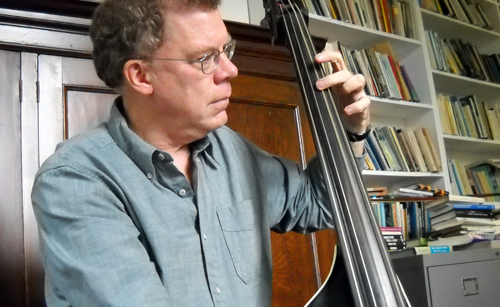
Books, more books and a double bass: That’s what confronts a visitor to David Lee’s office in Massey Hall in early September. A PhD student in the School of English and Theatre Studies (SETS), Lee is working on freeing some space by winnowing through a prof’s accumulated volumes lining shelves and stacked on tables.
One thing he’s not looking to purge is that David Lee-sized instrument case leaning against the wall.
Inside is his acoustic double bass, bought secondhand decades ago when he was still a regular at Toronto clubs. Unzipping the case, he displays the unusual black cutaway Framus, its edges outlined in white purfling, its body scuffed from more than a few gigs.
“It’s no Stradivarius,” says Lee as his fingers pull notes from the strings. Scuff marks and all, it’s durable and produces a big sound. “It’s made to look like an electric guitar.”
These days, what with writing and reading, he plays less often. One recent outing was during the annual Guelph Jazz Festival in September, when he took part in a workshop at the Macdonald Stewart Art Centre. “We just played and moved around the space.”
In a way, he might be describing the essence of improvised jazz – the topic of Lee’s doctoral thesis begun in 2011.
Specifically, he’s looking at Toronto’s improvised music scene of the 1970s and ’80s. That time and place involved not just jazz musicians but also dancers, actors, artists and writers – all brewing things up in a kind of Modernist melding.
The Artists’ Jazz Band was a free-jazz group of Canadian visual artists. The Four Horsemen brought together four poets to experiment with voice, sound and text. Improvising musicians were involved in dance and theatre.
Through it all ran what Lee calls the unifying thread of improvised music. He’s interested in how improv brought – and still brings — those disciplines together. Those connections formed the theme of a talk he gave at this year’s jazz festival colloquium called “A Place Where Anything Could Happen.”
In studying the Toronto of several decades ago, he’s also looking back at himself.
After moving to Toronto in 1975, Lee hung out and learned with musicians such as Bill Smith, Stuart Broomer, Maury Coles, Larry Cramer, John Oswald and Andy Haas. Playing both bass and cello, he toured and recorded with the Bill Smith Ensemble; along with Smith, he worked as co-editor of the jazz magazine Coda.
In clubs such as the Colonial Tavern, El Mocambo and the Horseshoe Tavern, he heard bassist Charles Mingus, multi-instrumentalist Anthony Braxton and pianist Cecil Taylor.
Despite that activity, Lee says, “there’s a gap in the scholarly record” about the period. Looking to fill that void, he plans to interview many of those personalities and dig up examples from what he calls “the golden age of cassette recording.”
He’s pursuing leads with the Canadian Jazz Archives Network at York University and with Art Metropole, a Toronto arts organization.
Lee plans to write a book about his studies. His earlier volumes include The Battle of the Five Spot about iconoclast Ornette Coleman and the late-1950s New York jazz scene, and Stopping Time about free-jazz pianist Paul Bley.
Both his writing and his music attracted the attention of Guelph English professor Ajay Heble. After meeting in Toronto in 2009, Heble invited Lee to apply for grad studies.
By then, Lee had completed a master’s degree in music criticism at McMaster University. That’s where he learned about critical theory and, particularly, ideas about artistic fields put forward by French philosopher and sociologist Pierre Bourdieu. He’s used Bourdieu’s model to look at power, influence and status in the jazz world.
Coming to Guelph made sense for Lee, who still lives in Hamilton with his wife, Maureen Cochrane. Besides being home to the 20-year-old jazz festival – co-founded and directed by his supervisor – U of G is the long-time base of the Improvisation, Community and Social Practice (ICASP) research project directed by Heble.
June saw the launch of the International Institute for Critical Studies in Improvisation at Guelph. Funded by a federal grant and building on ICASP’s record, the institute will use improvisation for teaching and learning and as a model for building successful communities.
Referring to Guelph as a hub for improv studies, Lee says, “There’s nothing like it anywhere in the world, so it’s the place for me to be right now.” He also likes what he calls a creative vibe between arts and science, both on campus and in the Guelph community.
Born in British Columbia, he studied English at the University of British Columbia before moving to Toronto. Besides his work in jazz, he and his wife ran a publishing company called Nightwood Editions.
Last year he published his first novel called Commander Zero. Now 61, he’s writing a young adult novel to be published by a Hamilton company in 2015.
And in between things, he still occasionally plays that double bass at Silence, a new improv and concert space opened this year in downtown Guelph.
“As scholars, we are always trying to train ourselves to respond to what’s around us on the highest possible level. Music is a great way to do that.”